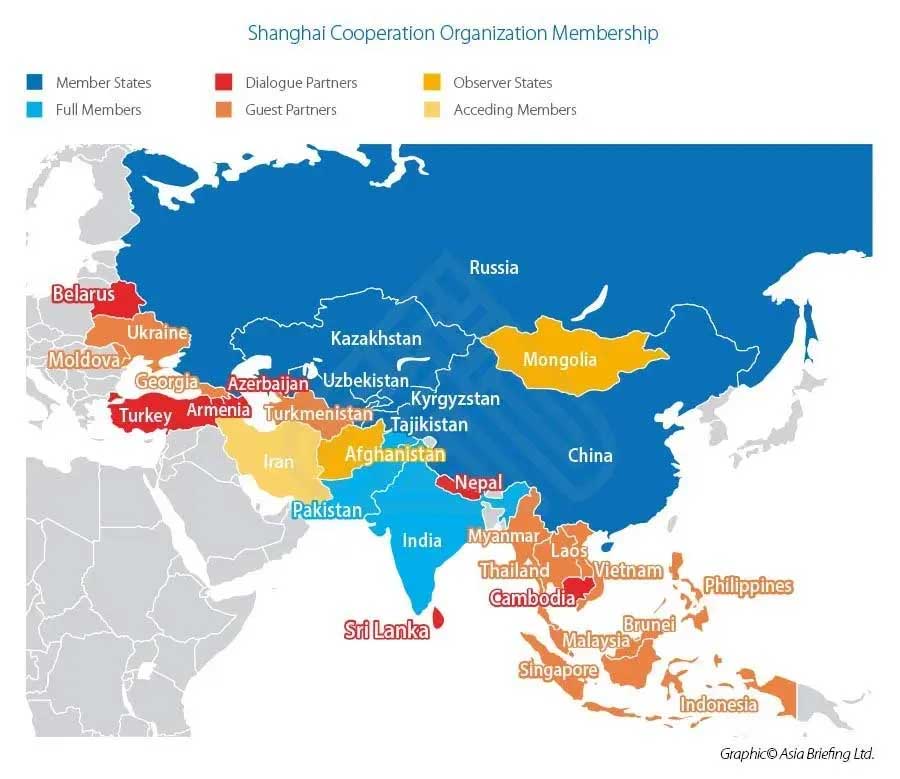The UAE Joins The Shanghai Cooperation Organisation As A Dialogue Partner
With the Middle East now on board, Israel will eventually have to choose between the United States and Eurasia as its core geographical base.
The UAE has become a dialogue partner of the Shanghai Cooperation Organization (SCO), according to the SCO secretariat, following a memorandum of understanding signed between the SCO countries and the UAE at the SCO Foreign Ministers meeting in Goa at the edn of last week. The UAE’s decision is part of a larger trend in the region of countries joining an organization that has heavy hitters – such as Russia, China, and India.
The SCO also includes Pakistan, Kazakhstan, Kyrgyzstan, Tajikistan, and Uzbekistan. This will be seen as another example of how China and Russia are making inroads in the Middle East, with member countries now hedging between the US-led hegemonic international order and a multipolar world – championed by Russia, Pakistan, Iran, India, Turkiye, and others, which prefer a weakened US and West to foreign policies focused on Asia.
Iran has also a memorandum to join the SCO, and it is not the only country in the Middle East looking to work with the organization – Egypt, Saudi Arabia, Turkiye, Qatar, Kuwait, Bahrain – and now the UAE are all dialogue partners.
While Iran joining the SCO counts as a country under sanctions joining a China-Russia grouping that benefits Tehran, the decision by other states in the region can be seen more as a reflection on their attitude towards the United States.
Saudi Arabia, the UAE, Bahrain and Egypt are all close partners of the US; Bahrain, the UAE and Egypt all have peace with Israel; Qatar is a major non-NATO ally of the US, while Turkey is a member of NATO.
The Middle East-SCO partnership is a fairly new trend. Turkiye signed up as a partner in 2012, but Bahrain, Kuwait, Qatar, Egypt, and Saudi Arabia only became dialogue partners within the last year. A rapid trend is growing in the region to recognize the SCO as important an important bloc.

Robert Rabil, a professor of political science at Florida Atlantic University, noted the importance of this trend. “Both organizations, led by China and Russia, are working to help the global transition from a unipolar world led by the USA to a multipolar world. That’s an attempt to reduce American preeminent global world, establish parallel organizations to World Bank and IMF, and de-dollarize the global market” he said, also noting that “What’s happening is a recent indication towards the reshaping of the new international order. Yet, the West’s foreign policy establishment, as promoted by its mainstream media, is acting as if nothing is happening and focusing on defeating Russia as a panacea to the spread of illiberal democracy.”
Established in 2001 as a successor to the Shanghai Five, the SCO is the largest regional grouping in Eurasia, covering around 40% of the world’s population and 30% of global economic output. Owing to its impressive profile of security and economic cooperation, the SCO has gained enormous traction across Asia. It is no surprise that numerous Middle Eastern and South East Asian countries are lining up to join as dialogue partners, observers and members.
The US has previously noted the bloc to be hostile towards it, but the SCO itself claims that the grouping is merely part of the new regionalism of the developing world, comparing it to the Gulf Cooperation Council (GCC) and Association of Southeast Asian Nations (ASEAN).
All are intergovernmental organizations with similar structures, defying the supranational mode of integration in the European Union. The SCO also shares significant similarities with the GCC and ASEAN in terms of its origin and evolution. It was created to combat the three evils of terrorism, extremism, and separatism. The GCC and ASEAN also came into being to address the security threat from Iran and communism, respectively. While regional security remains a common concern for both organizations, their real success lies in economic integration: GCC’s common market versus ASEAN’s economic community.
However, the rise of the SCO and other groupings like BRICS and CICA represents a shifting international order. In June 2019, a report at The Jerusalem Post noted that summits of CICA and the SCO in Central Asia that year were an illustration of how US influence was being challenged. At the time, Iran was seeking to play a larger role in these groupings.
Today, with Iran reconciling with Saudi Arabia and many countries in the Middle East also repairing relations, the SCO has a larger potential role to play. For states that are left out of the grouping, like Israel, this will be a symbol of countries that hedge their bets and those that are firmly planted in the West. How Israel later behaves as regards the SCO will be interesting to observe.
Related Reading
- The Shanghai Cooperation Organisation Meets In Goa
- Russia Urges Shanghai Cooperation Organisation To Set Up Joint Payments Network
About Us
Middle East Briefing is one of five regional publications under the Asia Briefing brand. It is supported by Dezan Shira & Associates, a pan-Asia, multi-disciplinary professional services firm that assists foreign investors throughout Asia, including through offices in Dubai (UAE), China, India, Vietnam, Singapore, Indonesia, Italy, Germany, and USA. We also have partner firms in Malaysia, Bangladesh, the Philippines, Thailand, and Australia.
For support with establishing a business in the Middle East, or for assistance in analyzing and entering markets elsewhere in Asia, please contact us at dubai@dezshira.com or visit us at www.dezshira.com. To subscribe for content products from the Middle East Briefing, please click here.
- Previous Article Iran – Shanghai Cooperation Organisation Trade Hits US$41 billion
- Next Article Performers, Entertainers Now Subject To Tax in the UAE





